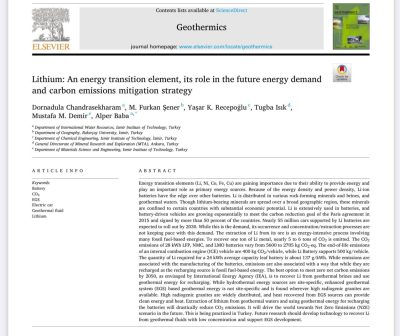Turkey receives US$ 600 million for renewable energy projects from the World Bank
Turkey Receives World Bank and First-Ever Clean Technology Fund Financing for Renewable Energy", which will have a big impact on development in the country and will also affect the numerous geothermal projects in the country.
As reported recently, “Turkey Receives World Bank and First-Ever Clean Technology Fund Financing for Renewable Energy”, which will have a big impact on development in the country and will also affect the numerous geothermal projects in the country.
“The World Bank Board of Executive Directors on May 28 approved financing of US$600 million for Turkey’s Private Sector Renewable Energy and Energy Efficiency Project.
The main objective of the project is to help increase privately owned and operated energy production from indigenous renewable sources within the market-based framework of the Turkish Electricity Market Law, thereby helping to enhance energy efficiency and curb greenhouse gas emissions as a result.
“As electricity demand has increased rapidly over the recent years of high economic growth, Turkey faces the twin challenge of ensuring energy security and containing greenhouse gas emissions to mitigate climate change. The Private Sector Renewable Energy and Energy Efficiency Project builds on the experience of the ongoing Renewable Energy Project. It aims to tap Turkey’s significant renewable energy potential from hydro, wind, solar, biomass, geothermal, and other resources. Moreover, the project includes energy efficiency measures to help reduce waste in energy consumption,” the World Bank reported.
The financing includes US$500 million from the International Bank for Reconstruction and Development (IBRD) and US$100 million from the Clean Technology Fund (CTF).
The Project is the first to use resources from the newly established CTF ? a new US$5.2 billion multilateral fund managed by the World Bank and administered through the World Bank Group and other multilateral development banks. The governments of Australia, France, Germany, Japan, Spain, Sweden, United Kingdom, and United States have made pledges or contributions to the fund. The CTF was set up to provide low-interest financing to scale up low carbon technologies to reduce greenhouse gas emissions during the period until a new global climate change agreement is negotiated and becomes effective.
“Turkey’s Renewable Energy and Energy Efficiency Project will help enhance energy security, support a clean energy transition, and increase private sector involvement in the development and financing of clean energy and energy efficiency investments,” said Ulrich Zachau, Country Director for Turkey. “The project establishes a financial mechanism through Turkish banks that will assist Turkish entrepreneurs in leveraging their capital to economically develop renewable resources. We are very pleased to be able to support this innovative project, and we are especially happy that this project will be the first to receive low-interest funding from the Clean Technology Fund (CTF) for renewable energy resource development.”
World Bank and CTF financing for the project will include two loans, one from the IBRD and one from the CTF, each to two Turkish development banks ? Türkiye Sinai Kalk?nma Bankas? (TSKB) the Turkish Industrial Development Bank (private) and Türkiye Kalk?nma Bankasi (TKB) the Turkish Development Bank (Government) ? for credit line financing of renewable energy and energy efficiency investments.
Other donors such as the Kreditanstalt für Wiederaufbau (KfW) and United Nations Development Program (UNDP) will provide parallel technical assistance financing from their existing and planned programs ? focused on capacity building for financial intermediaries and industries for energy efficiency investments. Additional financing and technical assistance is also expected to be provided by Agence Française de Developpement (AFD) and Japan International Cooperation Agency (JICA).
The Private Sector Renewable Energy and Energy Efficiency Project establishes a term lending facility within the TSKB and TKB. The IBRD loan and CTF allocation for TSKB is US$350 million equivalent and US$70 million respectively, while for TKB the allocation is US$150 million equivalent and US$30 million respectively.”
Source: FinChannel











